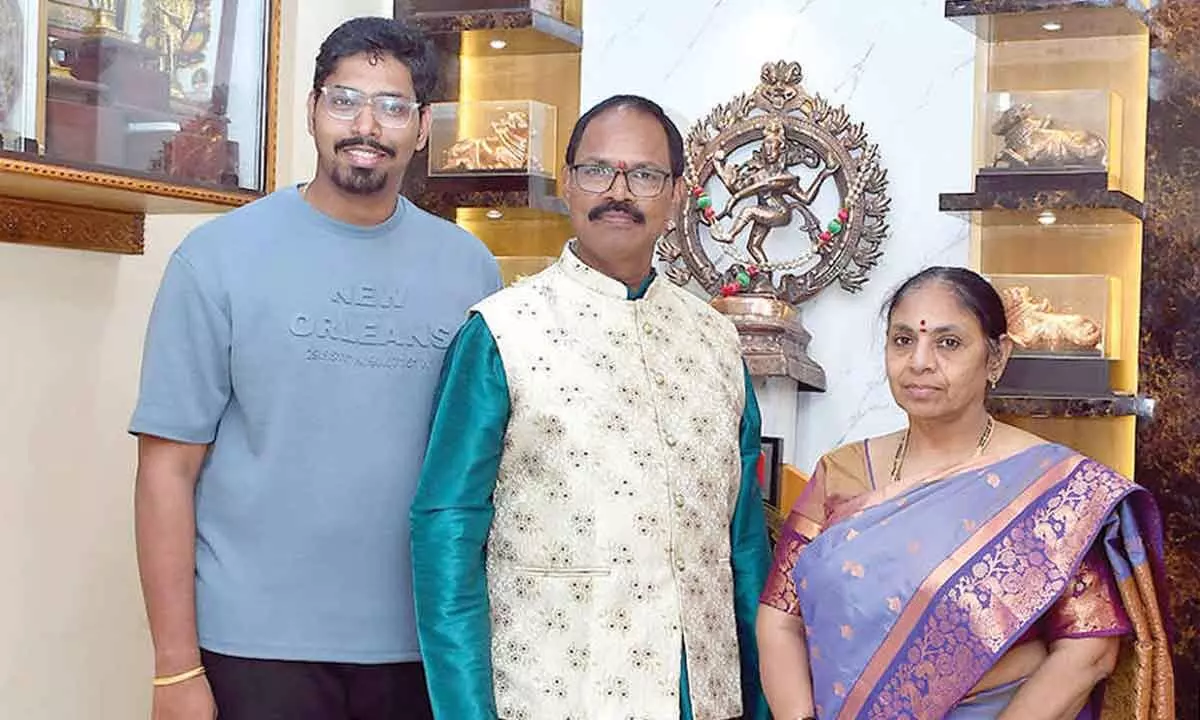‘Theatre carries forward our cultural legacy’

Urge to restore the tradition of staging dramas during festivals and fairs, a practice once integral to community life
Vijayawada : In the vibrant world of Telugu theatre, Dr PVN Krishna stands as a beacon of talent and commitment. A theatre activist, writer, actor, and director, he has dedicated his life to preserving and promoting the art of verse drama (Padya Natakam), a unique Telugu theatrical tradition. Born in 1962 in Vilasavilli village in Konaseema to Viswanatham and Narayanamma, Dr Krishna displayed an early affinity for the arts.
Speaking with ‘The Hans India,’ Dr Krishna passionately advocated for prioritising verse drama, emphasising its unparalleled cultural value and global uniqueness.
He believes that Telugu theatre faces a critical challenge today: the lack of platforms to showcase verse dramas. “Compared to social dramas, Padya Natakam receives limited attention, which is a disservice to our cultural heritage,” he said.
Dr Krishna urged temples to restore the tradition of staging dramas during festivals and fairs, a practice once integral to community life. He also called on the government to organise Verse Drama Festivals (Natakotsavams) at district level, fostering innovation and improving production quality with modern technical inputs.
His first stage performance was in Harikatha, a traditional storytelling art form, while in fourth grade. Encouraged by his teacher Kuchibhotla Satyanarayana, Krishna won accolades for his mono-action of Ashwatthama. His other mentor, PV Ramana Murthy, instilled in him the nuances of reciting poetic verses (Padyam), shaping his journey in verse drama.
Dr Krishna’s repertoire includes a remarkable range of verse dramas and social plays, such as Usha Parinayam, Prathama Swatantraya Mahasangramam -1857, Sri Khadga Tikkana, Sri Madhava Varma, Andhra Maha Vishnu, Prithviraj Raso, Vignana Bharatham, and Jayaho Sri Chhatrapati Shivaji Maharaj. His works are a testament to his deep understanding of history, mythology, and contemporary issues.
With over 2,400 performances to his credit across Andhra Pradesh and other states, he has portrayed iconic characters like Duryodhana, General Hugh Rose, Khadga Tikkana, Timmarusu, Tanguturi Prakasam and Chhatrapati Shivaji. His contributions have earned him 14 prestigious Nandi Awards and titles such as Bhasha Praveena, Rangasthala Krisheevala, and Nata Darshaka Virat.
Parallel to his artistic journey, Dr Krishna has had a distinguished career in the police force. Starting at Vijayawada’s One Town Police Station, he has received honours such as the Seva Pathakam, Uttama Seva Pathakam, Mahonnatha Seva Pathakam, and the Indian Police Medal for his exemplary service.
Despite his professional commitments, Krishna’s dedication to theatre and society remains unwavering. He and his friend Dr TVS Gireendranath founded an evening school under the Dr Raman Foundation to provide free education to underprivileged students. Today, the school, supported by his wife PVL Seshasai and staffed by dedicated teachers, continues to empower around 50 students.
As the President of Samskara Bharathi Andhra Pradesh, Dr Krishna is committed to reviving traditional art forms like Harikatha, Burrakatha, Tolubommalata, and Tappetagullu. “After retirement, I plan to focus entirely on promoting these disappearing traditions,” he shared.
Over the years, Dr Krishna has trained more than 200 young artistes, ensuring that the torch of Telugu theatre burns bright. “Theatre’s future lies in the hands of passionate, young talents. I find immense satisfaction in mentoring them,” he said.
Dr PVN Krishna’s multifaceted contributions to Telugu theatre, public service, and education reflect his extraordinary commitment to society. With his vision and relentless efforts, he continues to inspire countless individuals to embrace and celebrate the rich heritage of Telugu drama.
In his words, “Theatre is not just an art forum; it’s a way to connect with our roots and inspire future generations to carry forward our cultural legacy.”








